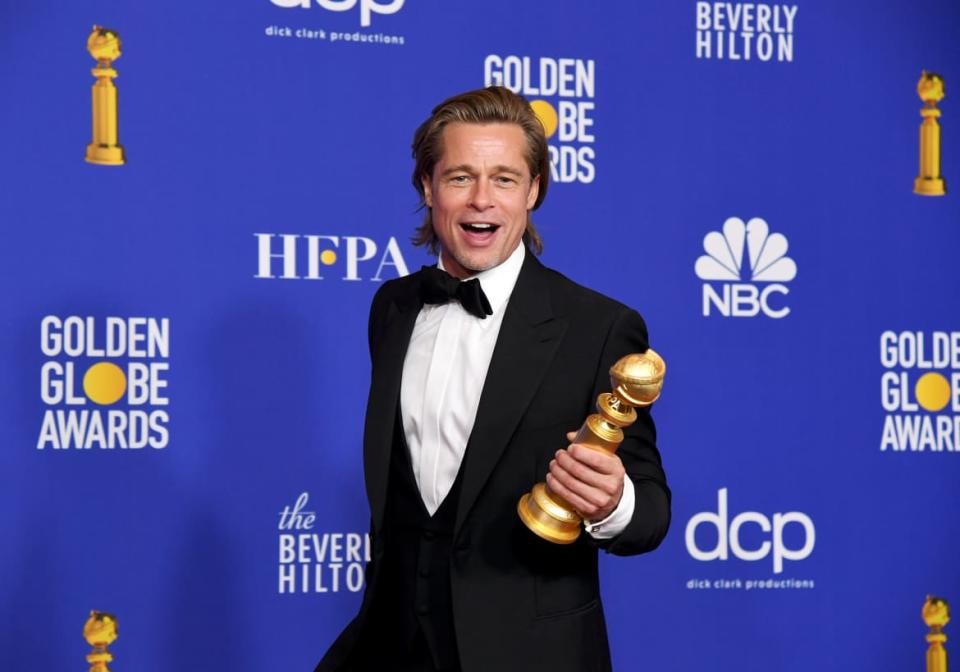Inside the Golden Globes’ Shady History of Awards-Giving

When Netflix’s cutesy Emily in Paris was nominated for two Golden Globes in January, including Best Television Series - Musical or Comedy, the news was met with eyerolls and confusion. Sure, actress Lily Collins was spunky and well-dressed enough for the streaming giant to promptly renew the show for a second season. But for the silly, sugary rom-com to beat out Michaela Coel’s acclaimed I May Destroy You? How could that possibly happen?
A few weeks after the announcement, there was a hint of an answer. Thirty-three members of the Hollywood Foreign Press Association (HFPA), which judges the Globes, were invited to Paris to tour the Emily in Paris set in 2019, courtesy of Paramount Network, the Los Angeles Times reported. A member told the outlet they were treated like “kings and queens.”
Indeed, they were. Not only was their stay at the ritzy Peninsula Paris hotel—which overlooks the Arc de Triomphe and is still charging upwards of $1,400 a night in a worldwide pandemic—comped, but they were treated to a ritzy gala event at the private and historic Musée des Arts Forains.
It’s all terribly over the top, but it’s only the most recent example of how members of the HFPA are wined and dined by studios in the hopes of securing awards for their TV shows, films, and stars.
The Extremely Chaotic 2021 Golden Globe Nominees: 17 Craziest Snubs and Surprises
How the HFPA got treated to this level of schmoozing dates back to its formation in 1943, when it was started by a small group of foreign journalists angling for better access to celebrities while covering the entertainment industry. The first Golden Globes was held the following year, and it didn’t take long for publicists to start cozying up to the association, looking to build buzz around a project and to possibly compel an Academy Award nomination.
“One thing that can’t be bought is a Golden Globe... officially,” quipped host Ricky Gervais during the 2010 show. “But if you were to buy one, the man to see would be [former HFPA president] Philip Berk.” (Berk himself was accused of groping actor Brendan Fraser.)
Beyond the slippery nature of the nominations, the Golden Globes is known as the booziest event of the awards season. Last year, a rep for Moët said 1,500 mini bottles of champagne were going to be handed out on the red carpet alone, plus the company had an extra 125 cases as backup for during the event.
And apparently it pays to have stars boozed up. The Globes are the third most-watched awards show after the Grammys and Oscars. NBC pays around $60 million to broadcast the event and a recent investigation by the Los Angeles Times found the HFPA had around $50 million sitting in the bank as of October.
With plenty of money to be made and milestone career achievements in sight, studios have long courted the association’s members. One of the first major controversies surrounding the HFPA’s practices was in 1982 with actress Pia Zadora. Despite her indie crime film Butterfly being panned by critics, she somehow won the award for “new star of the year” over Body Heat’s Kathleen Turner and Ragtime’s Elizabeth McGovern.
It was later revealed that her billionaire husband Meshulam Riklis, 30 years her senior, had jetted some HFPA members out to his Las Vegas casino for a private screening a few weeks before they voted.
In 2015, Zadora, who had since divorced Riklis, maintained to The Hollywood Reporter that her ex-husband “didn’t buy” her Globe, but admitted she now realizes what the “controversy was about.” “I get it,” she said. “I understand. Whether it was fair or not, I understand.”
As a result, CBS cut off its broadcasting agreement with the Globes. The awards show had previously been dropped by NBC in 1968 after the FCC accused it of “misleading the public of how the winners were chosen.”
There was another eyebrow-raising trip to Las Vegas in 2010, when Sony not only treated members to an all-expenses paid stay in Sin City, but had Cher perform a private concert for them. Not so coincidentally, the film company had two movies it was distributing: The Tourist, with Johnny Depp and Angelina Jolie, and Burlesque, starring Cher and Christina Aguilera. Both movies were box office disappointments and critics weren’t kind. Still, both movies nabbed nominations for Best Picture at the Globes.
In the past, HFPA members have traveled to destinations such as Cancun, London, and even Bora Bora for press junkets, although members allegedly have to pay their own way on overseas trips. (A studio source told US Weekly that for the Emily in Paris trip, the company did not pay for the members’ flights, and their stay at the five-star hotel was booked under a group rate.)
The HFPA also has rules that forbid gifts costing more than $125, but throughout the years, there have been freebies doled out that nearly tripled that value.
Members were forced to return a $400 Coach watch that was allegedly paid for by USA Films, who was trying to secure a Best Actress nomination for Sharon Stone for 1999’s The Muse. They also were asked to send back Focus Features’ gift of two bottles of pricey Tom Ford cologne while the studio was promoting Nocturnal Animals in 2016. (Aaron Taylor-Johnson ended up shocking awards pundits with a Best Supporting Actor win for the film.)
In a bombshell $2 million lawsuit from its longtime publicist Michael Russell in 2011, HFPA members were accused of regularly “abus[ing] their positions and engag[ing] in unethical and potentially unlawful deals and arrangements which amount to a ‘payola’ scheme.”
The breach of contract and fraud suit also contained allegations that the tax-exempt HFPA would give lesser-known media outlets prime spots on the Globes red carpet in exchange for a check.
Russell claimed he tried to raise concerns about such practices but was essentially fired when the HFPA declined to renew his contract, prompting him to sue. He ultimately reached a settlement in 2013 and the terms were never disclosed.

Hollywood Foreign Press Association President Lorenzo Soria and Lilla Soria attend the 92nd Annual Academy Awards at Hollywood and Highland on February 09, 2020, in Hollywood, California.
So, who are these oft-silent members being showered with free trips and given unfettered access to some of the biggest names in Hollywood?
The recent Los Angeles Times investigation revealed there are currently 87 members representing 55 countries that reach 250 million readers a year. It admitted three new members in October: Danielle Kool of the Netherlands, Sabrina Joshi of India, and Yulia Charysheva from Russia.
But beyond its newcomers, it’s difficult to nail down a complete list because their names aren’t on the association’s website. The Los Angeles Times was able to shed a bit more light, naming nearly a dozen members, including three Americans, who write for mostly obscure outlets all over the globe.
In 2018, former HFPA president Aida Takla-O’Reilly’s piece for EgyptAir’s Horus magazine drew attention for what was touted as an interview with Drew Barrymore. The article made insensitive remarks about the actress and her quotes were garbled. Barrymore’s team said she did not participate in the interview and the HFPA put out a statement that confirmed parts of the story were not written by Takla-O’Reilly, instead taken from “other sources.”
It’s hard to snag a membership with HFPA. Hopefuls have to be based in Southern California, cover entertainment for a foreign publication, submit 24 writing clips from the past three years, be sponsored by two current members, and fork over a non-refundable $500 initiation fee.
But sometimes jumping through all the hoops still isn’t enough.

"Brad Pitt, winner of Best Performance by a Supporting Actor in a Motion Picture, poses in the press room during the 77th Annual Golden Globe Awards at The Beverly Hilton Hotel on January 05, 2020, in Beverly Hills, California.
Last year, Norwegian journalist Kjersti Flaa sued the association for rejecting her application twice, first in 2018 and again in 2019. She claimed she was turned down because it didn’t want her competing for interviews against existing members who are “unwilling to share or dilute the enormous economic benefits they receive.”
“The HFPA not only fails to offer a fair procedure for seeking membership, it does not even make a pretense of doing so,” Flaa’s suit stated. “It also requires two votes of approval by the membership without providing any guidelines or standards for approving or rejecting applicants. It places no emphasis whatever on evaluating the quality of an applicant’s work. Instead, it freely allows its members to base their admissions decisions on whether an applicant might become a competitive threat to an existing member.”
A federal judge dismissed Flaa’s antitrust suit in November, writing she had achieved “professional recognition… without HFPA membership—and could not have been achieved if she were denied the ability to practice her profession.” Undeterred, Flaa is amending her complaint and Spanish journalist Rosa Gamazo has also joined in on the suit.
The Los Angeles Times investigation also found that while some members are people of color, no current members are Black.
Director Ava DuVernay reacted to the news with an eye-roll, tweeting that she wasn’t surprised. “Reveals? As in, people are acting like this isn’t already widely known? For YEARS?,” she wrote.
Many critics of the Golden Globe nominations were quick to correlate the lack of Black members to Coel being snubbed, as well as Spike Lee’s Da 5 Bloods, Shaka King’s Judas and the Black Messiah, and Ma Rainey’s Black Bottom being overlooked in the best film category. And while HBO’s Lovecraft Country was given a nod for best TV drama, no cast members were nominated in the acting categories.
As for the I May Destroy You snub, even Emily in Paris writer Deborah Copaken thought it was absurd. “Now, am I excited that Emily in Paris was nominated? Yes. Of course. I’ve never been remotely close to seeing a Golden Globe statue up close, let alone being nominated for one,” she wrote in The Guardian. “But that excitement is now unfortunately tempered by my rage over Coel’s snub. That I May Destroy You did not get one Golden Globe nod is not only wrong, it’s what is wrong with everything.”
The 78th Golden Globe Awards will air on Sunday, Feb. 28 at 8 p.m. ET/ 5 p.m. PT with hosts Tina Fey and Amy Poehler.
Get our top stories in your inbox every day. Sign up now!
Daily Beast Membership: Beast Inside goes deeper on the stories that matter to you. Learn more.

